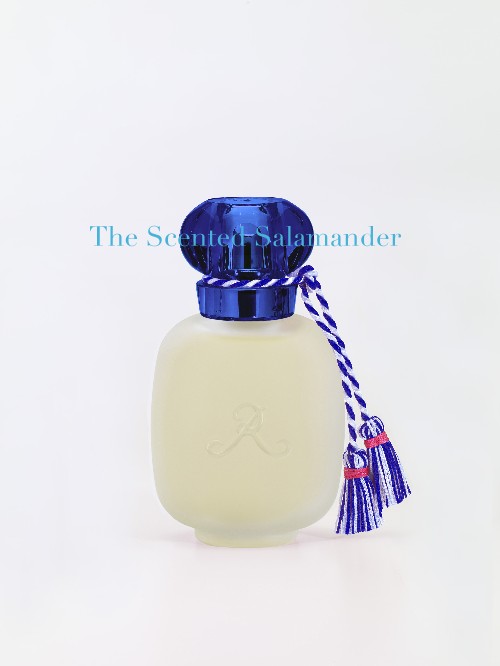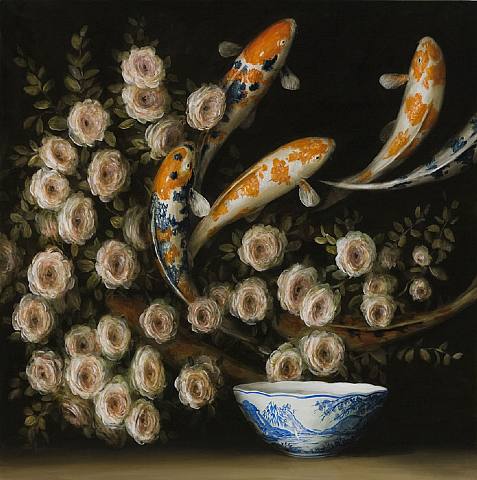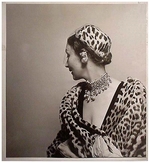Les Parfums de Rosine Une Rose au Bord de la Mer (2010) {Perfume Review & Musings} {Rose Notebook}

Une Rose au Bord de la Mer (A Rose by the Seaside) by Les Parfums de Rosine is the latest opus by the house destined to women (Rosissime is their latest masculine cologne) and the third one in the range of the Eaux Légères (Light Waters) for the summer. It is a limited-edition which was released in May of 2010 in a timely fashion to coincide with the period of anticipation of holidays by the sea. The Eau Fraîche was composed by perfumer François Robert and is his second "marine floral" for the house after Ecume de Rose (Rose Sea Spray) (2002).
At this point in the genealogy of modern marine perfumes (see A 19th Century Precursor of Marine Scents), it appears that the challenge is to refine the concept, if not necessarily renew it, while still carving out the possibility for fine perfumery to paint artistic, evocative marine landscapes. The fresh seaside breeze accord having become such a signature in home fragrances, not to mention the more localized bathroom fragrances, there is the risk of an automatic sentiment of a lack of refinement when smelling a scent which feels too much like a smell counterfeiting the sea. Indeed, a seaside holiday is a symbolic currency worth something these days...

Roses and Koi by David Kroll, 2008
Furthermore, popular fragrances like Happy by Clinique or Tommy Girl and virtually all the transparent tea fragrances in the markets tend to dull the exoticism of smelling this type of pale eau or escapist marine accord.
In this respect, Une Rose au Bord de la Mer does not completely avoid the pitfall of a banalized, ready-to-wear oceanic feel for part of its development but redeems itself more when the rose - the specialty of the house - becomes more prominent and takes over the déjà-vu, more pedestrian marine accord.
A discreet homage to French perfumery and a family member of nose François Robert, who is the son of Guy Robert and the grand-nephew of Henri Robert, can be perceived in the drydown and clarifies the throwback character of the rose bouquet in the perfume.
Notes: Neroli, Italian Bergamot, Rose Oil, Bitter Orange, and Mandarin. The heart rests on Immortelle absolute, rose absolute, white jasmine. The base notes are Cistus oil, amber, ambrette seed, white musk.
The Eau Fraîche, which is lasting like an eau de toilette, opens on a sweet Calone-smelling impression as if you were sipping a cup of lemon Lipton tea on a seaside promenade and there on a metallic table painted white, there would be for some slightly incongruous reason, a bowl containing a rose potpourri. The roses are rather dry, powdery, even evoking the smells of the Mediterranean scrubland as they betray herbal hints. The fragrance makes use of an immortelle absolute. A sweet amber profiles itself doubled by a subtle suggestion of animalic powdery ambergris.There are flashes of metal which can be ascribed to Bulgarian roses, but also in this case to the iodine-permeated seaside motif. The amber slowly makes its distinct presence felt more as the perfume becomes slightly more resinous and "sticky." It gives the impression of not so much a crystal-clear amber, as the fragrance is not sparkling, but that of a water-transparent one. The roses which are featured are said to be white roses and therefore an effort was visibly made to create a paler sensation.
The composition is not as poetic or storied as its name would suggest in my opinion, but true to a simpler purpose it smells like the pairing of a bouquet of roses with the air of the seaside and the smell of the ocean. Due to the nostalgic inflections of the quaint rose bouquet here, it makes you think easily of a socio-historical reference like that of the fashionable resorts on the Normandy coast during the Belle Epoque.
The notes which are used to delineate the marine landscape do not add anything really novel to the genre of marine scents despite the fact that we are told that "the marine accord is derived from a facet of the ambergris which was beautifully revealed by François Robert." In fact it may smell a little bit all too recognizable as a standard interpretation of the ocean when you want to bottle it. Depending on your own personal preferences and history, this may swim or sink with you. I think that the fragrance composition could have benefited from more thinking on how to render the sea motif. The immortelle note attempts to do that perhaps but does not really succeed in feeling transformative.
The perfume nevertheless becomes more delicate and refined when the rose accord manages to supersede the heavy-metal of the Calone.
The slightly unexpected twist here is that the rose accord is dry and herbal-y rather than lush and fresh. It suggests the dehydrating action of the sun, the dust of the road, but not so much the dessicated, hot feel of the sand. The perfume incidentally does not come across as beach-y as in those fragrances which are coconutty and reminiscent of bestselling sunscreen oils.
What the drydown reveals better is that the slightly antiquated feel of the rose bouquet here appears to be due to a discreet homage paid to one of the classics of French perfumery, Madame Rochas (1960), which was composed by the very father of perfumer François Robert, Guy Robert.
One now understands better why the roses here feel a bit like a throwback to the precious sensation of a rose potpourri or rose sachet imbibed with the 18th century tradition of scented hair powders.
Marine fragrances can be polarizing. It must be the proximity of the smell of the ocean to that of a fishmonger's stained apron which for centuries was rather the scent one wanted to cover. It is no mere chance if in the novel Perfume, the History of a Murderer, the hero Jean-Baptiste Grenouille is born under the stalls of a fish market to denote the unbearable grip of stench.
Given the straightforward style of the marine accord here, I doubt that Une Rose au Bord de la Mer will appeal to people who hope to be surprised by the genre. I think that this is the fragrance to try for persons who love both the smells of dusty roses and that of the sea, quite literally, and mixed together. The launch is reportedly limited to 200 copies, seeming to take into account the constraints of individual taste, although it appears more widely distributed than would be expected for such a limited output. On the other hand, fragrances such as L'Eau d'Issey, CK One, show that Calone-based perfumes are still widely popular. If you want to smell a rosier version of these, or already appreciate Eternity by Calvin Klein, and would be interested by a more rose-heavy rendition done with a quaint, dried-roses accord, it's also one to seek. Collectors of rose perfumes might also want to secure a bottle.
Price: 76€ for 100 ml. Available at les-parfums-de-rosine.com









